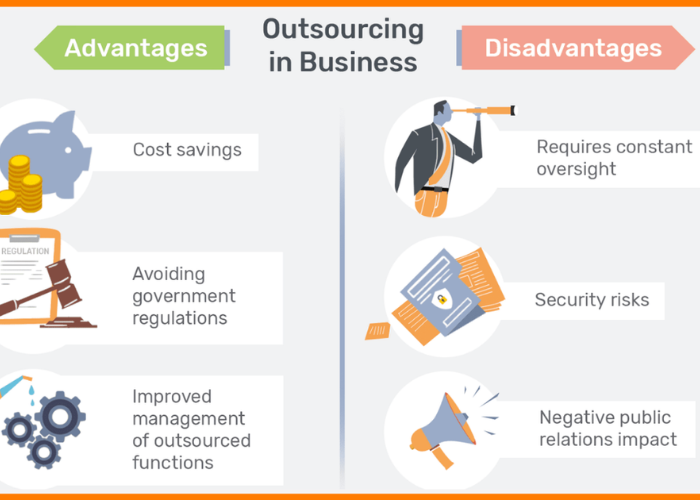Outsourcing has become an increasingly popular business strategy in recent times, with many companies looking to outsource certain tasks or operations to external companies or contractors. In the simplest terms, outsourcing is the process of delegating certain tasks or operations to an external provider, often located in a different country, to save costs or improve efficiency. While outsourcing can bring many benefits to a business, it is also important to understand the potential pitfalls and risks associated with outsourcing. The benefits and pitfalls of outsourcing, as well as how to overcome the potential pitfalls.
What is Outsourcing?
Outsourcing is the process of delegating certain tasks or operations to an external provider or contractor. This can include tasks such as customer service, software development, manufacturing, or marketing. Outsourcing is often used to save costs or to improve efficiency, as the external provider can often provide services at a lower cost or with more specialized skills than an in-house team. It can also be used to free up internal resources, allowing businesses to focus their efforts on their core activities.
Benefits of Outsourcing
Outsourcing can bring many benefits to a business, including:
Cost savings: By outsourcing certain tasks or operations to an external provider, businesses can often save money as they don’t need to hire in-house staff or purchase the necessary infrastructure and equipment.
Increased efficiency: By outsourcing certain tasks or operations, businesses can often benefit from improved efficiency as the external provider specializes in providing these services and can often complete tasks faster and of a higher quality.
Access to specialized skills: By outsourcing certain tasks or operations, businesses can access specialized skills and expertise that may not be available in-house. This can be particularly useful for businesses looking to access new markets or technologies.
Increased flexibility: By outsourcing certain tasks or operations, businesses can benefit from increased flexibility as external providers can often scale up or down quickly depending on the needs of the business.
Pitfalls of Outsourcing
While there are many benefits to outsourcing, there are also some potential pitfalls that businesses should be aware of before committing to an outsourcing agreement. These include:
Increased risk: By outsourcing certain tasks or operations, businesses may be exposed to increased risk as the external provider may not always comply with the necessary regulations or standards.
Loss of control: By outsourcing certain tasks or operations, businesses may lose some control over how these tasks or operations are completed as the external provider may have their own processes and procedures.
Cultural differences: By outsourcing certain tasks or operations to an external provider, businesses may encounter cultural differences that can affect how tasks or operations are completed.
Language barriers: By outsourcing certain tasks or operations to an external provider, businesses may encounter language barriers that can affect communication and understanding.
How to Overcome the Pitfalls of Outsourcing
While there are potential pitfalls to outsourcing, these can be overcome by taking certain measures. These include:
Research: Before committing to an outsourcing agreement, it is important to do thorough research on the external provider to ensure they meet the necessary standards and regulations.
Communication: It is important to maintain open and frequent communication with the external provider to ensure tasks or operations are completed as expected.
Flexibility: It is important to be flexible and to adapt to cultural differences and language barriers to ensure tasks or operations are completed as expected.
Oversight: It is important to have sufficient oversight over the external provider to ensure tasks or operations are completed as expected.
Conclusion
Outsourcing can bring many benefits to a business, including cost savings, increased efficiency, access to specialized skills, and increased flexibility. However, it is important to understand the potential pitfalls associated with outsourcing, such as increased risk, loss of control, cultural differences, and language barriers. By taking certain measures, such as researching the external provider, maintaining open and frequent communication, being flexible, and providing sufficient oversight, businesses can overcome the potential pitfalls of outsourcing.









